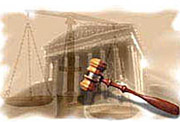| Vonage Holdings Corp., an Internet telephone company, asked a federal appeals court to throw out a patent verdict it lost in March, based on a U.S. Supreme Court opinion issued yesterday. The company today asked the U.S. Court of Appeals for the Federal Circuit in Washington to overturn a jury finding that Vonage infringed three Verizon Communications Inc. patents and send the case back to the trial court. The high court decision bolsters the argument that Verizon's patents are invalid, Vonage said in court papers. "We are very encouraged by the Supreme Court's decision," Jeffrey Citron, chairman of Holmdel, New Jersey-based Vonage, said in a statement. The ruling "should have positive implications for Vonage and our pending patent litigation with Verizon," he said. The high court devised a new test for determining when an invention is too obvious to warrant patent protection. The ruling makes it harder for those applying for patents, as well as patent holders seeking to win infringement lawsuits, to show they have developed a genuine innovation. "There is no merit" to the Vonage request, John Thorne, New York-based Verizon's deputy general counsel, said in a telephone interview. "It's a delaying tactic to avoid final resolution of the appeal." Yesterday's Supreme Court ruling concerning patent validity overturned a decades-old test used by the Federal Circuit. The case centered on the requirement that an invention be "non- obvious" and not simply combine prior inventions. Vonage was ordered by U.S. District Judge Claude Hilton in Alexandria, Virginia, to stop adding customers after losing the patent ruling. On April 24, the company won its request in the appeals court to continue business as usual while it appeals. The appeals court, which specializes in patent law, has set a June 25 hearing to consider Vonage's bid to reverse the jury verdict. |





